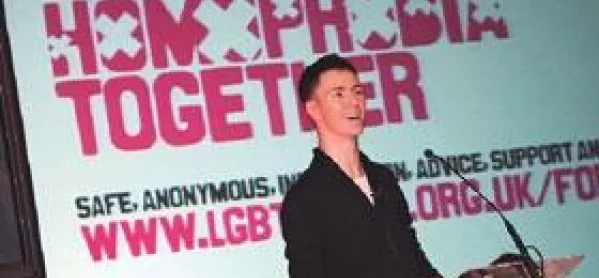The right to be yourself

More than two-thirds of Scottish pupils believe schools are not safe places for lesbian, gay, bisexual and transgender (LGBT) youngsters.
Although the survey was carried out only in the Scottish Borders, it canvassed the views of 500 pupils and is believed by LGBT Youth Scotland to reflect attitudes across the country. The findings coincide with the publication of Dealing with Homophobia and Homophobic Bullying in Scottish Schools, a “groundbreaking” guide sent to all secondaries.
The toolkit, launched last week at an LGBT Youth Scotland conference in Edinburgh last week on challenging homophobia, addresses not just blatant examples of bullying, but casual use of words such as “gay” in the playground and close-to-the-knuckle staffroom banter.
Grangemouth High took part in a trial and carried out a confidential survey of pupil attitudes. It uncovered a large number of incidents, which staff had not known about. Homophobic language was pervasive, if not always used in an intentionally malign manner: pupils did not see anything wrong with describing something as “gay” to mean substandard or unfashionable.
Staff often lacked confidence to tackle homophobia, said Nicola Masterson, principal pastoral teacher: “Challenging homophobia and prejudice has to become naturally part of everything we do.”
A guidance teacher at another school revealed that the challenge was not merely to boost colleagues’ confidence, but to overcome dissenting voices in the staffroom.
Musselburgh Grammar guidance teacher Stephen Gellaitry, whose school also trialled the toolkit, said S3 pupils expressed concern about the prospect of a friend coming out at school. He suggested that they might be as concerned about the response from staff as that from pupils.
One staff member with strong religious views felt unable to support the performance of a school play highlighting the effects of homophobia, arguing that people with “opposite views” should be allowed to make a presentation. The same person “had no hesitation presenting views that would be offensive to several members of the team”.
Liz McIntyre, an educational psychologist in Dumfries and Galloway and parent of a gay man, explained the impact of her son’s inability to be open about his sexuality at school. While she had vivid memories of his brother’s formative experiences, such as finding a girlfriend, she could recollect few from the teenage years of her other son, who came out to his parents when he was 18. “He was deprived of a very basic human right - the right to be himself,” she said.
www.ltscotland.org.ukhomophobicbullyingtoolkit Tips from the toolkit One boy’s story “I’ve always fancied other guys from a very early age,” says Skot Hogg- Robertson, 19. He “didn’t think anything of it” until he went to secondary school in the east of Scotland. Even though he had not come out, he was targeted because of a demeanour he himself describes as camp. The bullying started as barbed asides in the corridor, but got steadily worse. He was once set upon by another boy shouting the explicit sexual acts he was threatening to carry out. Skot says he was eventually being bullied by 200 people. He missed half of both third year and fourth year. He was moved to a class with pupils who had mental health, behavioural and other problems. “It was the most fabulous thing I had ever heard of,” he recalls. “I was safe in my wee sanctuary at the back of the school. I was accepted by everybody in the class.” With hindsight, however, he is upset that he was removed from mainstream classes: “I had my education compromised while the bullies had freedom to learn.” He managed to gain seven Standard grades, but left school shortly after the start of S5. Teachers tended to turn a blind eye to the comments and offensive gestures, but Skot has some sympathy for their situation: “Teachers can’t possibly be expected to educate young people about something they know nothing about.” His former school did not comment on the specifics of his experiences, but stressed that it acted “quickly and supportively” as soon as any young person was known to be suffering from bullying. The experience of most pupils testified to the school’s “safe, secure and supportive environment”, and it welcomed the toolkit as a means to review existing practice. Skot describes the toolkit as “groundbreaking” and a starting point for improving the way schools handle homophobia. His experiences have not, however, put him off school for life: he wants to become a drama teacher.
Keep reading for just £1 per month
You've reached your limit of free articles this month. Subscribe for £1 per month for three months and get:
- Unlimited access to all Tes magazine content
- Exclusive subscriber-only stories
- Award-winning email newsletters



